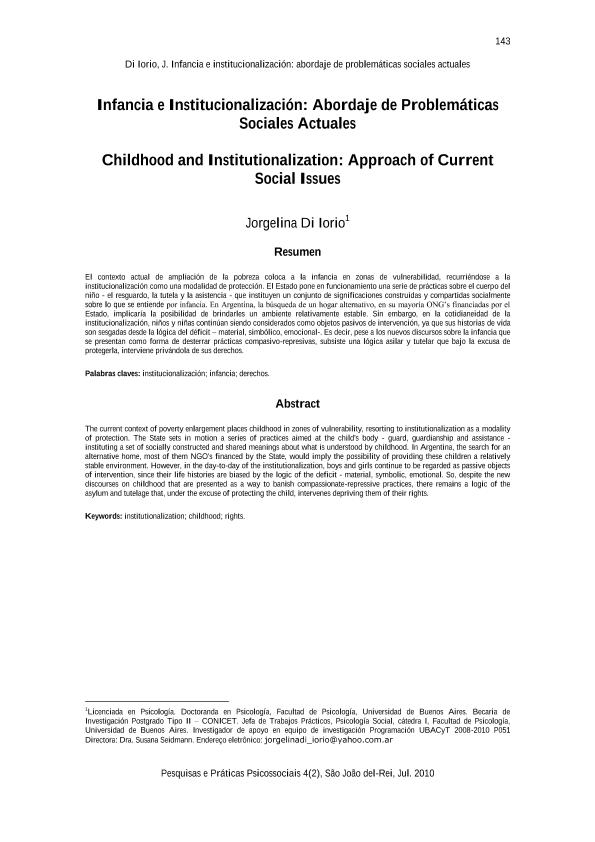Mostrar el registro sencillo del ítem
dc.contributor.author
Di Iorio, Jorgelina

dc.date.available
2023-03-03T13:37:38Z
dc.date.issued
2010-07
dc.identifier.citation
Di Iorio, Jorgelina; Infancia e institucionalización: abordaje de problemáticas sociales actuales; Universidad Federal de São João del Rei; Pesquisas e Práticas Psicossociais; 4; 2; 7-2010; 143-150
dc.identifier.issn
1809-8908
dc.identifier.uri
http://hdl.handle.net/11336/189498
dc.description.abstract
El contexto actual de ampliación de la pobreza coloca a la infancia en zonas de vulnerabilidad, recurriéndose a la institucionalización como una modalidad de protección. El Estado pone en funcionamiento una serie de prácticas sobre el cuerpo del niño -el resguardo, la tutela y la asistencia- que instituyen un conjunto de significaciones construidas y compartidas socialmente sobre lo que se entiende por infancia.En Argentina, la búsqueda de un hogar alternativo, en su mayoría ONG‟s financiadas por el Estado, implicaría la posibilidad de brindarles un ambiente relativamente estable. Sin embargo, en la cotidianeidad de la institucionalización, niños y niñas continúan siendo considerados como objetos pasivos de intervención, ya que sus historias de vida son sesgadas desde la lógica del déficit –material, simbólico, emocional-. Es decir, pese a los nuevos discursos sobre la infancia que se presentan como forma de desterrar prácticas compasivo-represivas, subsiste una lógica asilar y tutelar que bajo la excusa de protegerla, interviene privándola de sus derechos.
dc.description.abstract
The current context of poverty enlargement places childhood in zones of vulnerability, resorting to institutionalization as a modality of protection. The State sets in motion a series of practices aimed at the child's body - guard, guardianship and assistance - instituting a set of socially constructed and shared meanings about what is understood by childhood. In Argentina, the search for an alternative home, most of them NGO's financed by the State, would imply the possibility of providing these children a relatively stable environment. However, in the day-to-day of the institutionalization, boys and girls continue to be regarded as passive objects of intervention, since their life histories are biased by the logic of the deficit - material, symbolic, emotional. So, despite the new discourses on childhood that are presented as a way to banish compassionate-repressive practices, there remains a logic of the asylum and tutelage that, under the excuse of protecting the child, intervenes depriving them of their rights.
dc.format
application/pdf
dc.language.iso
spa
dc.publisher
Universidad Federal de São João del Rei
dc.rights
info:eu-repo/semantics/openAccess
dc.rights.uri
https://creativecommons.org/licenses/by-nc-sa/2.5/ar/
dc.subject
INSTITUCIONALIZACIÓN
dc.subject
INFANCIA
dc.subject
DERECHOS
dc.subject.classification
Otras Psicología

dc.subject.classification
Psicología

dc.subject.classification
CIENCIAS SOCIALES

dc.title
Infancia e institucionalización: abordaje de problemáticas sociales actuales
dc.title
Childhood and Institutionalization: approach of current social issues
dc.type
info:eu-repo/semantics/article
dc.type
info:ar-repo/semantics/artículo
dc.type
info:eu-repo/semantics/publishedVersion
dc.date.updated
2023-03-02T15:14:00Z
dc.journal.volume
4
dc.journal.number
2
dc.journal.pagination
143-150
dc.journal.pais
Brasil

dc.journal.ciudad
São João del Rei
dc.description.fil
Fil: Di Iorio, Jorgelina. Consejo Nacional de Investigaciones Científicas y Técnicas; Argentina. Universidad de Buenos Aires. Facultad de Psicología; Argentina
dc.journal.title
Pesquisas e Práticas Psicossociais
dc.relation.alternativeid
info:eu-repo/semantics/altIdentifier/url/http://www.ufsj.edu.br/revistalapip/revista_volume_4_numero_2.php
Archivos asociados
